Undergraduate Course Descriptions: Spring 2025
Need more info?
For the most up-to-date list of classes offered, visit the dynamic schedule. For questions about classes, consult our undergraduate advising page or contact the listed instructor. To see what we'll be offering in future semesters,
visit our two-year course rotation template. Interested in studying literature, taking a writing workshop, improving your writing
skills, or brushing up your teaching skills, but don't want to pursue a degree? You
should apply as a Non-Degree Seeking Student.
Jump to:
- African American Literature Courses
- Applied Linguistics/TESOL Courses
- Creative Writing Courses
- Literature Courses
- Professional Writing Courses
- Honors & Internships
*Click on each course title to read the professor's full course description; click on each thumbnail image to view the course flyer.
General Education Requirements:
ENGL 1010 - English Composition (multiple sections; online courses available)
Practice in expository writing with emphasis on content, organization, and style (levels
of usage and sentence structure) for different purposes and audiences.
ENGL 1020 - English Composition/Analysis (multiple sections; online courses available)
Practice in expository writing that synthesizes ideas from various readings. Includes
library work and production of documented papers.
ENGL 2201 - Literary Heritage (multiple sections; online courses available)
Major texts of literary heritage; modes of literary expression and cultural context;
emphasis on works as products of their historical contexts and as processes shaping
human consciousness.
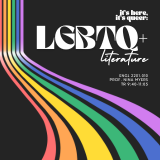 ENGL 2201.010 - Literary Heritage: LGBTQIA+ Literature | Prof. Nina Myers | TR 9:40-11:05
ENGL 2201.010 - Literary Heritage: LGBTQIA+ Literature | Prof. Nina Myers | TR 9:40-11:05
In this section of Literary Heritage, we will read texts representing the literary
modes of fiction, poetry, drama, and memoir with a focus on LGBTQ literature. The
course will explore topics such as defining LGBTQ literature, the differences between
and among lesbian, gay, bisexual, transgender, and queer literature, and the changes
in LGBTQ writing over time. This course asks students to use various literary criticism
models (LGBTQ critical theory, Feminist, African American, and New Historicism analysis)
as lenses.
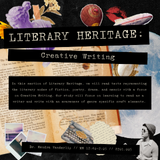 ENGL 2201.005 - Literary Heritage: Creative Writing | Dr. Kendra Vanderlip | MW 12:40-2:05
ENGL 2201.005 - Literary Heritage: Creative Writing | Dr. Kendra Vanderlip | MW 12:40-2:05
In this section of Literary Heritage, we will read texts representing the literary modes of fiction, poetry, drama, and memoir with a focus on Creative Writing. Our study will focus on learning to read as a writer and write with an awareness of
genre specific craft elements. The texts and assignments will provide a working vocabulary for analyzing a variety
of texts as well as critiquing peers' writings. Two-thirds of this course will focus on the academic study of published works by
requiring students to critically assess these works. The remaining one-third will
focus on the students' own creative writing. This class is highly recommended to students who wish to pursue a creative writing
major, or minor, as well as any students who want to explore their own creative work.
ENGL 2202 - Literary Heritage: African American Literature (multiple sections; online
courses available)
Consideration of major texts of literary heritage with emphasis on African-American
culture; modes of literary expression and cultural context; emphasis on work as products
of historical contexts and as processes shaping human consciousness.
African American Literature:
ENGL 3326 - African American Literature Since the Harlem Renaissance | Dr. Kathy Lou
Schultz | Online
Examination of African American literary tradition from the Harlem Renaissance to
the present; Chicago writers, integrationist aesthetics of the 1950s; black aesthetics
of the 1960s.
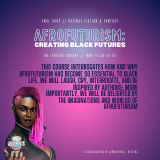 ENGL 3402 - Science Fiction & Fantasy: Afrofuturism- Creating Black Futures | Dr.
Shelby Crosby | MWF 11:30-12:25
ENGL 3402 - Science Fiction & Fantasy: Afrofuturism- Creating Black Futures | Dr.
Shelby Crosby | MWF 11:30-12:25
As a social, literary and cultural movement, Afrofuturism has taken the artistic world by storm. First established in 1993 by Mark Derry, Afrofuturism has blossomed into one of the most prolific artistic movements in recent history. Ranging in topics from literature, video gaming,
painting, music, etc. Afrofuturism is transforming how Black folk see themselves and
the world. This course is going to dive right into the middle of this conversation and interrogate
how and why Afrofuturism has become so essential to contemporary Black life. So, Afrofuturism is “an intersection of imagination, technology, the future and liberation…Both an artistic
aesthetic, and a framework for critical theory, Afrofuturism combines elements of
science fiction, historical fiction, speculative fiction, fantasy, Afrocentricity,
and magical realism with non-Western beliefs." This exciting field is going to be our playground for the semester. We will laugh,
cry, interrogate, and be inspired by our authors; more importantly, we will be delighted by the imaginations and worlds of Afrofuturism.
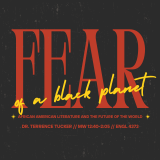 ENGL 4373 - Fear of a Black Planet: African American Literature & the Future of the
World | Dr. Terrence Tucker | MW 12:40-2:05
ENGL 4373 - Fear of a Black Planet: African American Literature & the Future of the
World | Dr. Terrence Tucker | MW 12:40-2:05
Called “post-soul” by some, the “Word Movement” by others, contemporary African American
literature has been influenced most directly black nationalism, black feminism, and
hip-hop music, all of which we will explore. This class will unfold through several
units, as we move from classic “literary” fiction to popular “street lit” to episodes
of Star Trek: Deep Space Nine. In each unit we will explore critical and theoretical frameworks animating those works,
whether they are the New Black Aesthetic, Afrofuturism, Black Southern Literary Tradition,
and Black Popular/Hip-Hop Fiction. What, we will ask, does the world look like with
African American literature at the center of the universe?
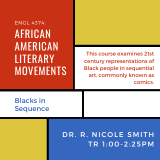 ENGL 4374 - African American Literary Movements: Blacks in Sequence | Dr. R. Nicole
Smith | TR 1:00-2:25
ENGL 4374 - African American Literary Movements: Blacks in Sequence | Dr. R. Nicole
Smith | TR 1:00-2:25
This course examines twenty-first-century representations of Black people in sequential
art, commonly known as comics. Students will explore the historical context, creation,
themes, and politics surrounding Black characters and narratives in comics. The course
will critically examine Black representation across diverse mediums, including manga,
novel adaptations, and existing superhero cannons, while offering a comprehensive
understanding of how these works have reshaped Black identities.
Applied Linguistics/TESOL:
ENGL 3501 - Modern English Grammar | TBA | Online
Introduction to current grammatical theory; description of sounds, word structures,
syntax, and semantics of English within theoretical frameworks.
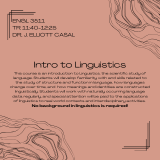 ENGL 3511 - Intro to Linguistics | Dr. J. Elliott Casal | TR 11:20-12:45
ENGL 3511 - Intro to Linguistics | Dr. J. Elliott Casal | TR 11:20-12:45
This course is an introduction to Linguistics, the scientific study of language. Students
will develop familiarity with and skills related to the study of structure and function
in language (phonetics/phonology, morphology, syntax, semantics/pragmatics), as well
as how languages change over time, how meanings and identities are constructed linguistically,
and how language policies shape language use. Students will work with naturally occurring
language data regularly, and special attention will be paid to the applications of
linguistics to real world contexts and interdisciplinary activities. No background
in linguistics is required!
ENGL 4530 - Practicum in ESL | Dr. Rebecca Adams | TBA
The course provides field experience in ESL teaching in through observing teaching
by ESL specialists in your local area and also by engaging in supervised teaching.
You will need to find a suitable ESL teaching context for the practicum. Please be
in contact with the instructor early (before the semester begins) to discuss options
for practicum sites.
ENGL 4531 - Methods & Techniques in ESL (multiple sections offered; online courses
available)
Methods and techniques of teaching English as a Second Language in various settings.
ENGL 4531.001 | TBA | TR 1:00-2:25
ENGL 4531.002 | TBA | MWF 11:30-12:45
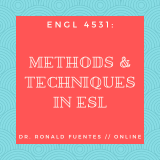 ENGL 4531.M50 | Dr. Ronald Fuentes | Online
ENGL 4531.M50 | Dr. Ronald Fuentes | Online
This class is designed to introduce methods and techniques of teaching English as
a Second Language in various settings. It examines our current understanding of second
language acquisition and the varying methods and techniques used to teach language
skills to students of English at the K-12 level and in intensive and immigrant programs
in the U.S. and overseas. The purpose of this course is to provide knowledge and experience
that will help you to better analyze learning situations, enhance your professional
skills, and increase your ability to promote learning.
ENGL 4531.M51 | TBA | Online
ENGL 4532 - Skills/App/Assessment in ESL | Dr. Lyn Wright | MW 12:40-2:05
Approaches to evaluation and means of assessment of language skills, with special
emphasis on English as a Second Language.
Creative Writing:
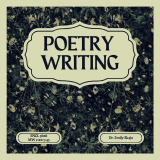 ENGL 3606.001 - Poetry Writing | Dr. Emily Skaja | MW 2:20-3:45
ENGL 3606.001 - Poetry Writing | Dr. Emily Skaja | MW 2:20-3:45
This is an introductory course for anyone who wants to learn more about writing and
reading poetry. Students will learn the conventions of the genre through creative
practice, close reading, and constructive critique, developing a final portfolio of
revised original work. Prior experience writing poetry is not necessary—curiosity
and enthusiasm will suffice! Everyone is welcome.
ENGL 3606.002 - Poetry Writing | TBD | TR 1:00-2:25
Exploration of the creative process within the forms and traditions of poetry. Emphasis
on student’s own work.
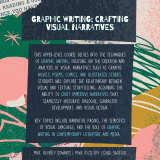 ENGL 3607.001 - Fiction Writing: Graphic Writing & Crafting Visual Narratives | Prof.
Veverly Edwards | MWF 10:20-11:15
ENGL 3607.001 - Fiction Writing: Graphic Writing & Crafting Visual Narratives | Prof.
Veverly Edwards | MWF 10:20-11:15
This upper-level course delves into the techniques of graphic writing, focusing on
the creation and analysis of visual narratives such as graphic novels, poems, comics,
and illustrated stories. Students will explore the relationship between visual and
textual storytelling, acquiring the ability to craft immersive narratives that seamlessly
integrate dialogue, character development, and visual design. Through in-depth studies of diverse graphic texts, students will engage in critical
discussions on the cultural, social, and political implications of graphic literature.
The course emphasizes writing for visual media, including the development of detailed
scripts, storyboarding, and illustration.
ENGL 3607.002 - Fiction Writing | TBD | TR 9:40-11:05
Exploration of the creative process within the forms and traditions of fiction. Emphasis
on the student’s own work.
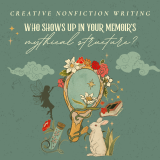 ENGL 3608 - Creative Nonfiction Writing | Prof. Veverly Edwards | MW 12:40-2:05
ENGL 3608 - Creative Nonfiction Writing | Prof. Veverly Edwards | MW 12:40-2:05
This course introduces students to the various forms and traditions of creative nonfiction
including memoir, literary journalism, the personal essay, and innovative forms through
the examination and discussion of published work and work produced by students in
a workshop environment, with the goal of further developing the particular voice and
style of each student. Classic as well as innovative examples of creative nonfiction
will be discussed as well as how to use these as models or springboards for student
work.
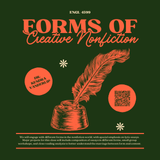 ENGL 4599 - Forms of Creative Nonfiction | Dr. Kendra Vanderlip | TR 11:20-12:45
ENGL 4599 - Forms of Creative Nonfiction | Dr. Kendra Vanderlip | TR 11:20-12:45
The goal of this course is to engage with different forms in the nonfiction world,
with special emphasis on lyric essays. Major projects for this class will include
composition of essays in different forms (new journalism, environmental, memoir, borrowed
form, etc.), small group workshops and close reading analysis to better understand the marriage
between form and content. Students will leave class with a thorough understanding
of the many different forms in creative nonfiction.
 ENGL 4601 - Poetry Workshop | Prof. Marcus Wicker | MW 2:20-3:45
ENGL 4601 - Poetry Workshop | Prof. Marcus Wicker | MW 2:20-3:45
This is an upper-level undergraduate poetry workshop devoted to the creation, revision,
and critical analysis of poetry. Building on the skills developed in ENGL 3606 (Poetry
Writing), students will study poetry as an art form, working in admiration of its
history, difficulty, and depth. The students will write original poems and read collections
of poetry with attention to figurative language, form, music, and arrangement. The
workshop is a supportive environment where students are invited to encourage and challenge
one another as their creative work expands and intensifies. ENGL 3606 (Poetry Writing) is a prerequisite. May be repeated for maximum of 6 hours
credit with permission of instructor.
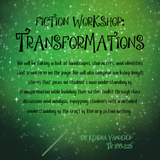 ENGL 4603 - Fiction Workshop: Transformations | Dr. Kendra Vanderlip | TR 1:00-2:25
ENGL 4603 - Fiction Workshop: Transformations | Dr. Kendra Vanderlip | TR 1:00-2:25
This course places heavy emphasis on workshop and reading in preparation for workshop. The theme
of this workshop class will be on “Transformations” We will be taking a look at landscapes, characters, and identities that transform on the page. We will also compose workshop length stories that focus on student’s own understanding of transformation while building their writer toolkit through class discussion and analysis, equipping
students with a detailed understanding of the craft of literary fiction writing.
Literature:
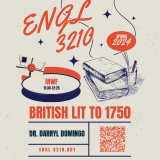 ENGL 3210.001 - British Literature to 1750 | Dr. Darryl Domingo | MWF 11:30-12:25
ENGL 3210.001 - British Literature to 1750 | Dr. Darryl Domingo | MWF 11:30-12:25
This course will introduce students to the formative periods in the British literary
tradition, beginning in the eighth century and running through to the middle of the
eighteenth century. We will examine the development of genres and themes over time
and analyze their relationship to broader developments in British culture, including
the shift from oral to written to print, the persistence of pagan values in a Christian
state, the nature of heroism, the emergence of colonialism and notions of nationalism,
the consumer revolution, the invention of a social, sexual, and political “self,”
novelty and the rise of the “novel.”
ENGL 3210.002 - British Literature to 1750 | Dr. Cristina Maria Cervone | TR 1:00-2:25
Students will gain a broad overview of British literature and its cultural contexts
from its beginnings in early Britain up to the middle of the eighteenth century. The
class will ask the following questions of a variety of British literary texts and
their original audiences: What do we consider literature? What did they consider literature?
Why were certain forms, themes, and plots popular, and how can we learn to appreciate
them from a modern perspective? How does a text become “timeless”?
ENGL 3220 - British Literature Since 1750 (multiple sections):
Survey of major authors, themes, and movements in American literature from the colonial
period through 1865.
3220.001 | TBD | MWF 10:20-11:15
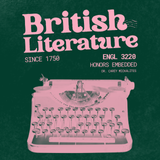 3220.002/301 | Dr. Carey Mickalites | TR 11:20-12:45 (honors embedded)
3220.002/301 | Dr. Carey Mickalites | TR 11:20-12:45 (honors embedded)
This survey explores a vast historical range of literary texts and their engagements
with a rapidly changing world of Britain and its relationship to the larger world.
We will read Romantics writing in the age of Revolution, Victorians wrestling with
industrial and imperial expansion, modernists inventing new forms for a dramatically
changing social landscape and on into periods of postcolonial struggle, and in each
of these periods we will see authors challenging the increasingly prevalent reach
of capitalism and its discontents.
3220.M50 | Prof. Stacy Smith | Online
ENGL 3327 - American Literature to 1865 (multiple sections):
Survey of major authors, themes, and movements in American literature from the colonial
period through 1865.
ENGL 3327.002/350 | Dr. Theron Britt | TR 1:00-2:25
ENGL 3328 - American Lit to 1865 | Dr. Theron Britt | TR 9:40-11:05
Study of American literature and literary movements from 1865 to the present.
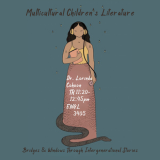 ENGL 3405 - Multicultural Children's Literature: Bridges & Windows Through Intergenerational
Stories | Dr. Lorinda Cohoon | TR 11:20-12:45
ENGL 3405 - Multicultural Children's Literature: Bridges & Windows Through Intergenerational
Stories | Dr. Lorinda Cohoon | TR 11:20-12:45
This course engages in critical analysis of multicultural and international children’s
literature (books designed for infant-adolescent audiences) and centers on the rich
and varied cultures represented in multicultural texts, providing opportunities to
explore multiple historical and contemporary perspectives and topics, as well as to
select, analyze, and interpret multicultural literature for youth.
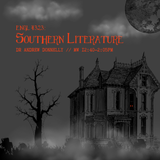 ENGL 4323 - Southern Literature | Dr. Andrew Donnelly | MW 12:40-2:05
ENGL 4323 - Southern Literature | Dr. Andrew Donnelly | MW 12:40-2:05
What is the South to the nation? Is it different and exceptional, contradicting national
ideals with stubborn or subversive narratives? Or is it the truth of the country,
revealing its hidden, real identity? In this course, we will look for answers to these questions (and more!) in the literature
of the US South, as it develops through the periods of slavery, the Civil War and
Reconstruction, segregation and the Civil Rights Movement, and into the 21st-century. We’ll look in particular to the South’s foremost literary export, the Southern
Gothic, as well as a range of Southern authors including Mark Twain, Harriet Jacobs,
William Faulkner, Flannery O’Connor, Tennessee Williams, Randall Kenan, Jesmyn Ward,
and others.
Professional Writing:
ENGL 3601 - Intro to Technical & Professional Writing (multiple sections):
Introduction to rhetoric and style of documents written by scientists, engineers,
technical writers, and other professionals; extensive practice in writing reports,
proposals, manuals, and correspondence.
ENGL 3601.M50 | Prof. Terry Ansbro | Online
ENGL 3601.M51 | TBD | Online
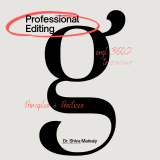 ENGL 3602 - Professional Editing: Principles & Practices | Dr. Shiva Mainaly | TR
11:20-12:45
ENGL 3602 - Professional Editing: Principles & Practices | Dr. Shiva Mainaly | TR
11:20-12:45
This course offers a comprehensive exploration of professional editing, equipping students
with the critical skills necessary to refine and polish a wide range of documents
for diverse audiences and contexts. Mastering the art of editing is not just about
fixing errors but also about shaping communication to ensure clarity, accuracy, and
impact in every field. Students will delve into the nuanced processes of editing,
including copyediting, content editing, and proofreading while mastering industry-standard
tools such as style guides, markup software, and collaborative editing platforms.
The course emphasizes the key elements of effective editing—clarity, coherence, and
precision—alongside the ethical responsibilities editors face in maintaining accuracy and integrity.
ENGL 3603 - Engineering Communications (multiple sections offered):
Form and contexts of written and oral communications in engineering professions; extensive
practice in oral reporting, written reports, manuals, and proposals.
*Does not apply to the English major or minor.*
ENGL 3603.001 | Dr. Adam Sneed | MWF 10:20-11:15
ENGL 3603.002 | Dr. Adam Sneed | MWF 11:30-12:25
ENGL 3603.003 | Dr. Adam Sneed | MW 12:40-2:05
ENGL 3603.004 | Prof. Calen Verbist | TR 9:40-11:05
ENGL 3603.005 | Dr. Chloe Robertson | TR 1:00-2:25
ENGL 3604.001 | Dr. Scott Sundvall | TR 9:40-11:05 **online section also offered,
3604.M50**
This course will explore how style and content have historically worked in and through
persuasive writing, as well as how they work in our contemporary moment. We will explore
the function of style and content in various mediums and genres. The course will be
anchored by the assumption that there is little difference between the two anymore.
ENGL 3604.M51 | Prof. Terry Ansbro | Online
Study and practice of writing essays and reports with emphasis on persuasion; introduction
to empirical and library research, application of rhetorical principles, and nature
of evidence, including numerical; academic and professional writing, editing, and
revision.
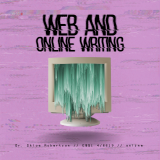 ENGL 4619 - Web & Online Writing | Dr. Chloe Robertson | Online
ENGL 4619 - Web & Online Writing | Dr. Chloe Robertson | Online
This course is intended to review specific ethics, writing practices, design modalities,
and information management norms online. Students will be introduced to best practices
in the field and will have the opportunity to create social media campaigns, engage
in collaborative online writing, and gain skills with web editing software.
Honors & Internships:
ENGL 4640 - Internship in English | Rachel Cantrell | TBA
Experience with a local community partner requiring the assistance of English majors
with strong oral and written communication skills. Dependent upon availability. Visit our internships page for more information.
ENGL 4996 - Honors Thesis | Dr. Cristina Maria Cervone | TBA
Students engage in individual, intensive study of a unique problem or issue in English
Studies, culminating in a long piece (approx. 40 pages) of scholarly writing. Visit our English honors page for more information.

